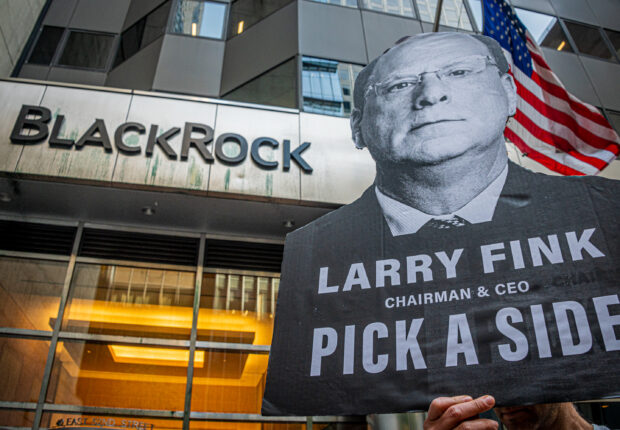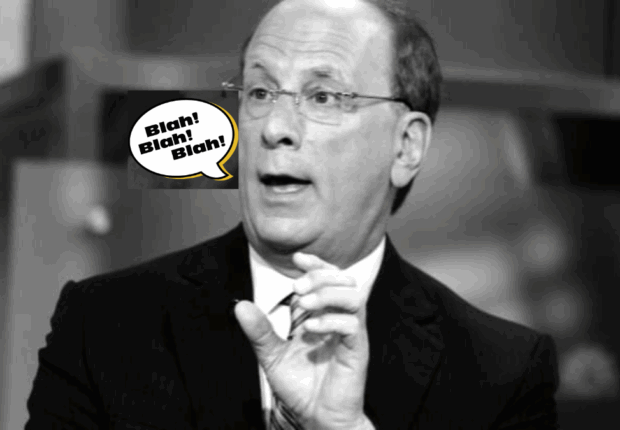BlackRock has been put at the center of a growing campaign against climate action and ESG investing.
Timeline of selected anti-ESG attacks and BlackRock’s response – full graphic here
While there is legitimate criticism of environmental, social, and governance (ESG) investing, the relentless campaign maligning ESG has nothing to do with standardization of fund labels, combating greenwashing, demands for increased transparency, or any other valid critique. It is a massive oppositional effort serving three distinct, but related interests: Republican electoral interests, fossil fuel industry interests, and the opportunistic interests of BlackRock’s competitors.
The right-wing efforts to vilify ESG has all the hallmarks of a classic GOP culture war: willfully misinterpreting an existing practice to stir up animus and create a convenient new wedge issue to win votes. With the midterms just around the corner, Republican politicians from former Vice President Mike Pence to Senator Ted Cruz to Governor Ron DeSantis are currently hard at work turning ESG into the Right’s next boogeyman.
This is nothing new; Republicans are running the same playbook as their crusade against CRT (Critical Race Theory). And just as with CRT, their decrying of “woke capitalism” isn’t only a PR campaign. State and local Republican officials are carrying out a systematic, coordinated effort to cut off financial institutions for addressing climate risk.
This leads straight to the next intersection of ESG opponents: fossil fuel interests. Texas comptroller Glenn Hegar and West Virginia state treasurer Riley Moore are both members of the State Financial Officers Foundation, a Heritage Foundation and American Petroleum Institute sponsored organization with close ties to ALEC. As part of its new “anti fossil fuel boycott” law, Texas is demanding testimony from several financial institutions including BlackRock to determine “fossil fuel discrimination.” Meanwhile, Moore used a nearly-identical law he championed last month to ban BlackRock along with four other financial institutions from doing any West Virginia state business due to their coal policies.
Another prominent SFOF associate is businessman Vivek Ramaswamy who first rose to prominence in conservative circles with his book, Woke Inc. Ramaswamy can often be seen on Fox News or the opinion section of the Wall St. Journal — and of course all over twitter — railing against BlackRock and ESG investing, which he maligns as “woke capitalism” designed to “push a political agenda.” Ramaswamy, like his SFOF compatriots, conveniently ignores the fact that climate risk generates economic risk as a matter of cold, hard reality (or would that be hot, melting reality?).
Ramaswamy’s relentless attacks also include blaming BlackRock for spiking oil prices instead of, say, Russia’s war on Ukraine and increased, pent up “post pandemic” demand. It should come as no surprise that after months of targeting BlackRock, Ramaswamy’s newly-launched asset management company, Strive, has been courting red state business and is this week debuting the firm’s first index funds under the motto “it’s time to drill”.
BLACKROCK’S RESPONSE
BlackRock, meanwhile, has desperately been trying to appease the litany of attacks. It sent a letter to Texas in response to the state’s initial inquiry into energy company boycotts celebrating its status as “perhaps the world’s largest investor in fossil fuel companies.” This letter did not prevent the state from demanding further testimony from BlackRock and threatening subpoenas for hearings to be held later in the year.
When West Virginia announced its ban of five financial institutions over coal policies, the difference between JPMorgan Chase’s statement and BlackRock’s was stark. JPMorgan responded with “this decision is shortsighted and disconnected from the facts … [our] business practices are not in conflict with this anti-free market law.” BlackRock instead granted the premise of the ban and simply responded that it “does not boycott energy companies” and does “not pursue divestment from sectors and industries as a policy.”
While Larry Fink did push back in his 2022 letter to CEOs and assert that “stakeholder capitalism is not ‘woke’, is not political,” more often BlackRock is on the defensive. Instead of pointing to the validity of evaluating climate risk as a serious economic risk from which BlackRock has a fiduciary duty to protect its clients, spokespeople often point instead to a new proxy voting option for clients the firm debuted late last year.
It is very clear that BlackRock cannot placate its way out of being targeted. It has become — like it or not, accurate or not — the poster child for the U.S. political Right’s anti-ESG campaign, with wannabe competitors like Ramaswamy eagerly fanning the flames.
Simultaneously, BlackRock’s backsliding on its climate commitments has not been going unnoticed. The firm voted for just 24% of environmental and social shareholder proposals this past AGM season compared to last year’s 43%. The net zero interim commitment BlackRock announced as signatory to the Net Zero Asset Managers’ initiative left out a quarter of its investments and cited only “expectations” that the other three quarters would be in alignment. These moves are imperiling BlackRock’s position managing hundreds of billions of dollars in funds with net-zero committed clients from New York City to Japan to Europe.
BlackRock acknowledges the energy transition is inevitable and already underway. The firm has stated many times that it considers climate risk to be economic risk. Denying this is not an equal and opposite opinion, and BlackRock is not “woke” by asserting it. The asset manager is in fact just one of many financial institutions fulfilling their fiduciary duty by responding to the economic and existential reality. Any arguments to the contrary are the last gasps of climate denialism, and BlackRock should stop bending over backwards to try to appease it — or to pacify those that are using the firm as a political punching bag. They’re not going to stop either way.

